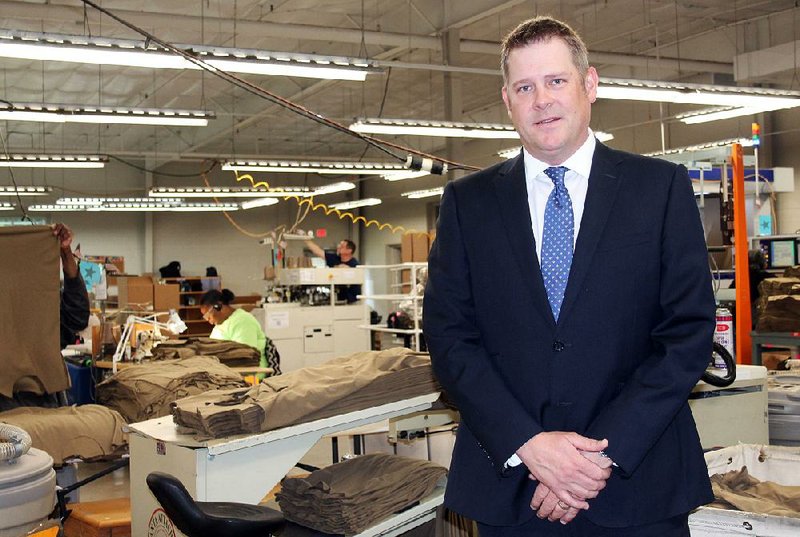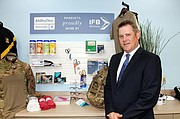The IFB Solutions facility at 69th and Murray streets in Little Rock covers 78,000 square feet. It is where blind and visually impaired workers produce clothing and accessories for the military as well as spiral-bound notebooks and other paper products.
A tiny portion of that nearly 80,000 square feet is a closet-size room just to the right of the building's front door.
This space is the Community Low Vision Center, which sells devices such as talking clocks and timers, reading machines, canes, dark glasses and other items to IFB workers and the public.
Toni Fraser manages the center and showed off its wares to visitors late last month.
Fraser, who is visually impaired, demonstrated machines that can read printed text and a device that reads prescription labels. The latter isn't for sale at the center -- they can be had for free from Walmart -- but she can show someone how they work.
"These are huge," she says. "We're just about to send an email or a phone blast to all of our employees to let them know about this, and if they want a demonstration they can come here."
Bingo for Bags, in which participants play bingo for designer handbags and luggage, has been the main fundraiser that helps keep the Low Vision Center stocked.
It's also a change from, say, a fundraising golf tournament or 5K run.
"We started doing this because it was so different," says Reed Gibbons, who serves on the IFB advisory council and is a member of the Bingo for Bags committee. "It gets a little loud, but it's also a lot of fun."
The event, which happens 6-10 p.m. Sept. 19 at Chenal Country Club, 10 Chenal Club Blvd., Little Rock, will feature heavy hors d'oeuvres, cocktails, music, a silent auction and 10 games of bingo. Tickets are $100.
"Each winner gets a designer handbag with a value of over $200," Gibbons, 42, says.
The grand prize is a Louis Vuitton Speed 35 Monogram bag valued at more than $1,000.
What happens if there are two bingos at once?
Well, it's a real sophisticated process, Gibbons says.
"They will do some kind of game. Last year we did a lot of Rock, Paper, Scissors. There's a winner, but the other person goes away with a gift card or something like that."
This will be Bingo for Bags' fourth year, and participation has increased at each event.
"In our first year, we had maybe 150 people," Gibbons says. "This year we're hoping to have 400 people."
Gibbons is the vice president of commercial sales, leasing and investments with the RPM Group and got involved with IFB about five years ago at the urging of his mother-in-law, IFB volunteer Judy Phillips.
"When I came here and met some of these people, it was an instant fit," he says. At Thanksgiving and Christmas, he serves meals at the plant with his wife, Amber, and their 9-year-old daughter and 13-year-old son.
IFB Solutions traces its roots to Arkansas Lighthouse for the Blind, a small workshop founded at the Arkansas School for the Blind in 1940 by Methodist minister Jeff Smith. In 1945, the group moved to a shop on Ninth Street, which was dedicated by one of America's most famous activists for the blind and deaf, Helen Keller. The Lighthouse operation moved to its current spot in 1966.
Lighthouse joined IFB Solutions, a Winston-Salem, N.C., nonprofit, in 2014. It is the largest employer of blind and visually impaired people in the United States.
Of the 140 workers at IFB Solutions in Little Rock, 70% are blind or visually impaired. The Little Rock operation cranks out 2.4 million notebooks and 720,000 military T-shirts each year. IFB also produces tens of thousands of clothing items for extreme weather conditions for the military.
Samuel Parker worked in the paper department at IFB for seven years before moving to clothing almost two years ago.
He was living in Magnolia when he began losing his eyesight to glaucoma.
"It wasn't caught in time," he says from behind dark glasses at his workstation. "By the time I found out I had it, it was already too late. It gradually took my eyesight. I had pretty useful vision for two or three years, but the glaucoma had done so much damage and I kept having surgery after surgery and it came to the point where I had too much scar tissue on my corneas."
He moved to Little Rock and attended classes at World Services for the Blind for two years before coming to IFB.
"Magnolia is a small town, and I didn't even know blind people could work," he says. "Being able to work here, I love it."
For information, visit ifbsolutions.org/events1/bingoforbagslittlerock/
High Profile on 08/25/2019

